
North Carolina residents have a wide range of options for health insurance. Whether you don't currently have coverage or you are unemployed, there are many options available to you. There is no reason for you to be without any type of coverage. The ability to have health insurance can help prevent you from being left without cover and incurring huge medical bills.
North Carolina health insurance costs
North Carolina's average cost of health insurance is not as high as other states. However there are some variations between counties. The average cost of health insurance in North Carolina is $6,352 per person and $25,408 per family. This is $629 more than the national standard. But, just like anywhere else, the cost of health insurance in North Carolina varies depending on the type of insurance you choose and the population you are insuring. The chart below will allow you to compare insurance costs in North Carolina.
North Carolina's individual health insurance market is dominated by Blue Cross Blue Shield, which controls nearly ninety-seven percent of the state's individual market. According to federal data, North Carolinians paid less for their health insurance in 2021 than in 2019. North Carolina also has the highest number of enrollees receiving premium tax credits or subsidies. In fact, 93% North Carolina residents received some subsidy to reduce the cost of their coverage. Furthermore, North Carolinians were granted larger average monthly subsidies than people in the rest of the country. North Carolina's average monthly subsidy amount was $568 in comparison to the $491 national median.
Exclusions for pre-existing conditions
North Carolina individual health insurance policies are subject to exclusions for pre-existing conditions. These exclusions can be reduced if the policyholder is able to show creditable previous health coverage. Prior coverage is considered creditable if it covers a pre-existing condition within six months of the time of the policy start date.

Prior to the Affordable Care Act insurers could deny coverage and charge higher premiums for individuals with certain conditions. However, this was not the case in all cases. A national survey revealed that almost a third were declined for or charged more to insure due to preexisting conditions. In addition, 54 percent of people with individual market insurance were concerned about dropping coverage due to pre-existing conditions.
Premiums
The 2018 average premium for a North Carolina family insurance plan was $18,211 compared to less than $12,000 in 2008 However, premiums are not equally distributed between counties. North Carolinians with health insurance through their employers paid close to 14 percent of their state median income. That's a difference from just over eleven% in 2008. In comparison, the average American spends 8 percent on their health care costs in 2008 and 11 percent in 2018.
Americans are now able to afford health insurance thanks to the Affordable Health Act. The Affordable Health Act's Health Insurance Marketplace allows individuals in North Carolina to purchase health insurance for less that $600 per calendar month. You can either purchase health insurance through a private company or the Marketplace. Enrollment in health insurance plans in North Carolina is open from November 1 to January 15, but a qualifying event must occur before a person can enroll in an Exchange plan.
Short-term plans
The best way to bridge the gap between short-term and regular coverage is with short-term insurance. These plans are ideal for those who have just recently been divorced, want to supplement or retire early, as well as people looking to replace their existing coverage. Short-term plans typically have fewer requirements than standard health insurance, so it's important to compare the features of each plan. You will be able to compare the premiums, deductibles and copays of each plan, as well as maximum benefits and plan start dates.
North Carolina residents can access short-term, temporary health insurance plans if they need it. These policies can be used to replace individual health insurance policies and last for up to 36 months. These plans can sometimes be renewed for longer periods. They are also very affordable, especially if you don't have coverage through an employer.

Medicare coverage
You may be eligible for Medicare coverage if you are a senior citizen in North Carolina. There are many plans to choose from. They are often tiered and offer different levels of coverage. There are also different supplemental coverage options, and some plans even offer prescription drug coverage. Original Medicare has the most basic coverage and allows you to choose a provider anywhere in the U.S.
Original Medicare is Medicare's most basic form. It covers doctor visits and medical equipment as well as mental health services and ambulance services. Original Medicare does not cover prescription drugs, but you can get prescription drug coverage through Medicare Part D. Alternatively, you can opt for one of the Medicare Advantage Plans, which include HMOs, PPOs, Private Fee-For-Service plans, and Special Needs Plans. These plans may include vision and hearing coverage and fitness programs.